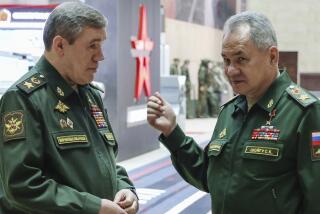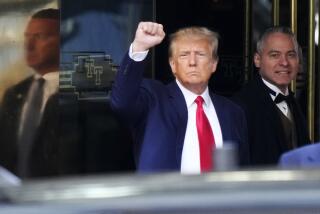Serbian Elections Could Fuel Demand for Milosevic’s Arrest
- Share via
BELGRADE, Yugoslavia — Slobodan Milosevic’s Socialists are headed for another humiliating defeat today in Serbian elections, and the polls suggest that voters want more than just better lives from a new government.
The parliamentary elections will increase the pressure on Yugoslavia’s new leaders to arrest Milosevic, who was ousted as Yugoslav president in October, and put him on trial for crimes such as robbing the country of billions of dollars, according to a leading pollster.
“We have done a lot of focus groups, and in every one, people mentioned this and asked, ‘Why are they so late?’ ” said Srdjan Bogosavljevic, head of the Strategic Marketing and Media Research Institute. “The pressure [for Milosevic’s arrest] is very high, and I don’t think they can avoid that,” he said. “It should be within the next six months.”
Today’s elections in Serbia, the dominant of Yugoslavia’s two republics, will allow Yugoslav President Vojislav Kostunica’s 18-party coalition to consolidate its power. The results of Bogosavljevic’s poll released Tuesday show Kostunica’s alliance leading with 72% support to just 14% for the Socialist Party, which Milosevic still heads.
The alliance, which has named Democratic Party chief Zoran Djindjic as its choice for Serbian prime minister, is so far ahead that its candidates have barely bothered to campaign.
But cracks are already showing in the coalition as it confronts the country’s enormous economic, social and political problems. And the longer Milosevic is left free to lead the opposition, the greater his chances of a comeback, analysts believe.
During the past decade of war, economic sanctions and misrule, Milosevic and his cronies allegedly stole billions of dollars from the national treasury. It’s that crime--and not war crimes for atrocities committed in campaigns against non-Serbs--for which he is most likely to stand trial here.
More than 70% of Serbian voters believe that Milosevic should be put on trial, compared with only 13% who say he shouldn’t be, according to a poll published Monday by the Center for Research Alternatives.
Only 41% would support adding war crimes to charges of corruption, electoral fraud and misuse of power, the same poll found.
The Serbian election campaign has been overshadowed by daily revelations of corruption during Milosevic’s 13-year rule. The evidence is piling up so fast that the daily Blic, the country’s largest-circulation newspaper, published a 24-page special section Wednesday cataloging Milosevic-era corruption under the headline: “Dossier: How the Country Was Robbed.”
Several popular local TV stations aired a 35-minute documentary alleging massive theft and harassment by Milosevic, his family and his cronies.
The media onslaught has been so intense that the Socialist Party lodged a discrimination complaint with monitors from the Organization for Security and Cooperation in Europe, the same body that Milosevic once railed against as “Western spies.”
Some of the latest corruption allegations leveled in the Serbian media against Milosevic, his family and top lieutenants include:
* Top Milosevic loyalists owned lavish mansions in the exclusive Dedinje district of Belgrade, the Serbian and Yugoslav capital, even though their official salaries were less than $1,000 a month.
* These heads of state-owned companies and institutions, whose workers struggle to live on an average salary of $35 a month, were buying luxury cars that cost more than $35,000.
* Milosevic’s hairdresser received a loan for about $250,000 from the country’s largest state-owned bank to renovate her salon, and so far there is no evidence that she paid it back.
So far, the most specific allegation against Milosevic is that he signed and submitted false information about his housing situation to buy a new house two days before the North Atlantic Treaty Organization launched airstrikes against him March 24, 1999.
Although that wouldn’t rank very high in the annals of world corruption, the claim has infuriated people here more than any other because at the time Milosevic was demanding total sacrifice from the country as it prepared for war.
Evidence of more serious corruption is expected to emerge once Kostunica’s allies take full control of Serbia’s government and start opening the files--if the most telling haven’t already been destroyed.
The United States believes that Milosevic’s regime stole at least $1 billion, while economist Mladjan Dinkic, now the head of Yugoslavia’s Central Bank, claims that the figure is closer to $4 billion.
Milosevic’s defenders admit that millions of dollars were transferred to accounts in countries such as Cyprus, Lebanon and Russia but insist that was the only way to circumvent economic sanctions when all official Yugoslav accounts were frozen.
The U.N. war crimes tribunal at The Hague has indicted Milosevic and four of his senior officials on war crimes charges in Kosovo, a separatist province of Serbia now under U.N. control.
More to Read
Sign up for Essential California
The most important California stories and recommendations in your inbox every morning.
You may occasionally receive promotional content from the Los Angeles Times.













